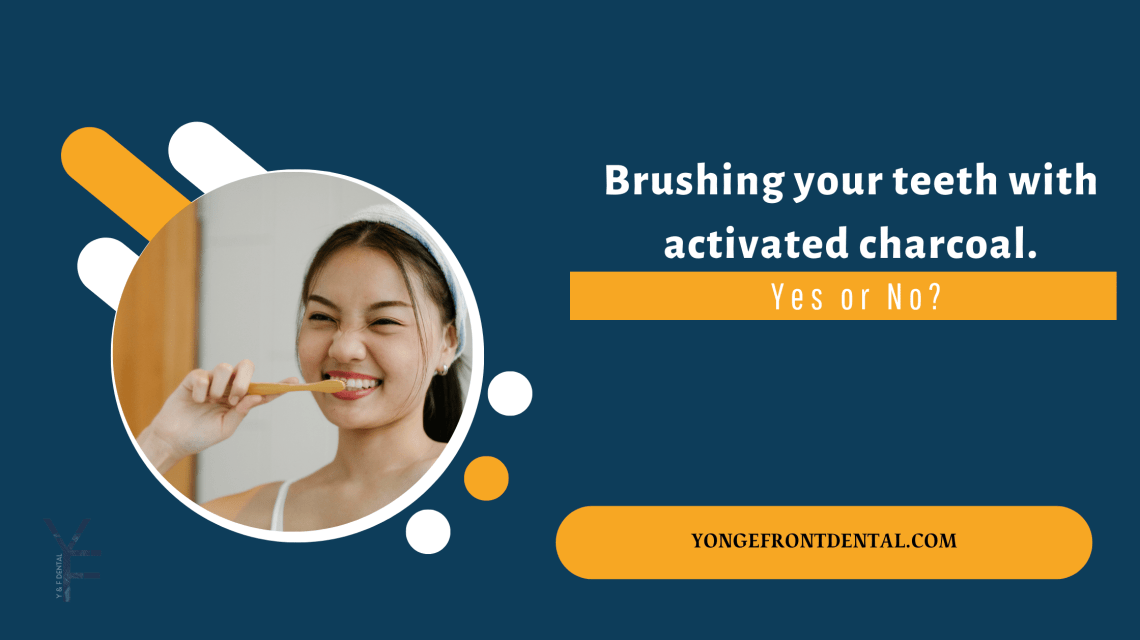The striking image of someone brushing with what appears to be black toothpaste has become increasingly common across social media platforms. This unusual oral care trend centers around activated charcoal a substance that promises a brighter smile without professional intervention.
Is Brushing Your Teeth with Activated Charcoal Safe?
As patients at Yonge and Front Dental frequently inquire about this alternative whitening method, we’ve decided to examine the evidence. Does this dark powder truly deliver on its promises of a whiter smile, or might it present risks to your dental health? This comprehensive guide will help you separate fact from fiction when it comes to the activated charcoal phenomenon.
What is Activated Charcoal?
Activated charcoal is not the same as the charcoal used for your summer barbecue. It’s a fine black powder made from various carbon-containing materials like coconut shells, peat, or wood that have been “activated” through a special heating process. This activation creates millions of tiny pores, increasing the surface area and making the charcoal highly absorbent.
For centuries, activated charcoal has served as a medical intervention for certain types of poisoning and drug overdoses, as it can bind to toxins in the digestive tract before they’re absorbed into the bloodstream. This powerful absorptive quality is what inspired its application in oral care products, based on the theory that it might similarly bind to and remove stains and impurities from teeth.
Today, you’ll find activated charcoal in numerous oral care products:
- Toothpastes
- Powders
- Mouthwashes
- Whitening strips
- Dental floss
The Claims: Why People Use Activated Charcoal for Teeth
Proponents of charcoal-based dental products make several appealing claims about its benefits:
Stain removal:The main attraction is the promise that activated charcoal can absorb and remove surface stains from coffee, tea, wine, and tobacco, revealing a brighter smile.
Natural alternative:Many users are drawn to activated charcoal as a “natural” option compared to traditional whitening products containing hydrogen peroxide or other chemicals.
Detoxification:Some products claim that activated charcoal can “detoxify” the mouth by removing bacteria and toxins, though this claim requires scientific scrutiny.
Cost-effectiveness:At-home charcoal treatments typically cost less than professional whitening procedures, making them an attractive option for budget-conscious consumers.
The visual contrast of black charcoal against white teeth, combined with dramatic before-and-after photos on social media, has certainly contributed to the popularity of this trend. However, the science behind these claims deserves careful examination.

The Science: What Research Says
Despite its widespread popularity, scientific evidence supporting activated charcoal for dental use remains limited. Here’s what current research tells us:
A 2019 review published in the British Dental Journal raised concerns about the lack of scientific evidence supporting the effectiveness and safety of charcoal dentifrices. The researchers noted that many products made unsubstantiated therapeutic claims.
The American Dental Association (ADA) has not granted its Seal of Acceptance to any activated charcoal dental products, citing insufficient scientific evidence regarding safety and effectiveness.
Potential Risks and Concerns
Dental professionals have expressed several concerns about the regular use of activated charcoal on teeth:
Abrasiveness and Enamel Damage
Activated charcoal ranks higher on the Relative Dentin Abrasivity (RDA) scale than many traditional toothpastes. This abrasiveness can:
- Wear down tooth enamel over time
- Increase sensitivity
- Create a rougher tooth surface that may actually collect more stains
- Lead to a more yellow appearance as the enamel thins and the yellowish dentin layer becomes more visible
Effects on Dental Restorations
Activated charcoal can potentially:
- Stain composite restorations, making them stand out against natural teeth
- Scratch the surface of crowns, veneers, or fillings
- Create microscopic scratches where bacteria can accumulate
Gum Health Considerations
The fine particles can become lodged in the gingival sulcus (the space between your gums and teeth), potentially causing:
- Irritation
- Inflammation
- Increased risk of gum disease for those with existing periodontal issues
Long-term Effects
Perhaps most concerning is the lack of long-term studies on activated charcoal’s effects on oral health. Most dentists recommend caution when using products without substantial scientific backing, especially when used regularly on irreplaceable tooth enamel.

How to Use Safely (If You Choose To)
If you still wish to try activated charcoal for teeth whitening despite these concerns, here are recommendations for minimizing potential risks:
Limit frequency:Use charcoal products occasionally rather than daily. Consider using them once every two weeks as a supplement to your regular oral hygiene routine.
Choose carefully:If possible, select products with:
- Lower abrasivity ratings
- Added ingredients to help remineralize teeth (such as fluoride)
- Clear instructions from the manufacturer
Apply gently:Never scrub vigorously with charcoal products. Use light pressure and circular motions.
Consider application method:Some dental professionals suggest applying the charcoal and letting it sit briefly before very gently brushing, which may reduce abrasion while still allowing the charcoal to bind to surface stains.
Watch for warning signs:Discontinue use if you experience:
- Increased tooth sensitivity
- Gum irritation
- Noticeable changes in tooth texture
Remember that even if used safely, activated charcoal is not a replacement for regular brushing and flossing with proven products.
Professional Alternatives for Teeth Whitening
At Yonge and Front Dental, we offer several clinically proven teeth whitening options that provide predictable results without compromising your dental health:
In-Office Professional Whitening
Professional whitening treatments use carefully formulated peroxide-based gels at concentrations that effectively brighten teeth while minimizing sensitivity. Benefits include:
- Results in a single visit (typically 60-90 minutes)
- Dentist supervision for safety
- Gum protection during the procedure
- Customized treatment based on your specific needs
- Dramatic results that can lighten teeth by several shades
Take-Home Professional Kits
These dentist-provided kits feature:
- Custom-fitted trays that ensure even application and minimize gum exposure
- Professional-grade whitening gel at appropriate concentrations
- Instructions tailored to your dental condition
- Gradual whitening that can be adjusted according to sensitivity
- Convenience of home use with professional oversight
Both options address intrinsic and extrinsic staining, with results that typically last from several months to a year, depending on lifestyle factors and maintenance.

Our Professional Recommendation
Based on current scientific evidence and clinical experience, the team at Yonge and Front Dental recommends caution regarding activated charcoal for teeth whitening. While it may provide some superficial cleaning benefits, the potential risks to enamel and oral health may outweigh the modest whitening effects.
For patients seeking whiter teeth, we generally recommend:
- Maintaining excellent oral hygiene with regular brushing and flossing
- Using ADA-approved whitening toothpastes for daily maintenance
- Considering professional whitening treatments for significant results
- Attending regular dental cleanings to remove surface stains
- Limiting consumption of staining foods and beverages (coffee, tea, red wine)
Every patient’s dental needs are unique, and what works for one person may not be appropriate for another. This is why personalized professional advice is invaluable when considering any whitening treatment.
Conclusion
The activated charcoal trend highlights our collective desire for natural, affordable solutions for a brighter smile. However, when it comes to dental health, evidence-based approaches should take precedence over internet trends.
While occasional use of activated charcoal products may not cause immediate harm for many people, the lack of long-term safety data and potential for enamel abrasion raises legitimate concerns among dental professionals. Your teeth are meant to last a lifetime, and protecting your enamel should be a priority in any oral care routine.
AtYonge and Front Dental, we’re committed to helping you achieve a beautiful smile without compromising your dental health. We invite you to schedule a consultation to discuss the whitening options that would be most effective and appropriate for your specific situation. Our team can provide personalized advice based on your dental history, current oral health, and aesthetic goals.
Remember, the brightest smile is one that’s both beautiful and healthy for years to come.
FAQs About Teeth Whitening
Is activated charcoal safe for daily use on teeth?
Most dental professionals recommend against daily use due to concerns about abrasiveness and potential enamel damage. Occasional use (once every few weeks) may pose less risk, but consult with your dentist first.
Can activated charcoal remove deep stains or just surface stains?
Activated charcoal primarily works on surface stains through mechanical abrasion. It cannot change the intrinsic color of teeth or address internal discoloration, which often requires peroxide-based treatments.
How do professional teeth whitening results compare to charcoal treatments?
Professional treatments typically produce more dramatic, consistent, and longer-lasting results because they can address both external and internal discoloration using clinically proven methods.
Are there safer natural alternatives for whitening teeth?
Oil pulling, baking soda, and hydrogen peroxide have been studied more thoroughly than activated charcoal, though all have limitations. Professional advice is recommended before trying any DIY whitening method.
How can I maintain my white smile after treatment?
Regular brushing and flossing, limiting staining foods and beverages, avoiding tobacco, using a straw for acidic or colored drinks, and attending regular dental cleanings all help maintain whitening results.


